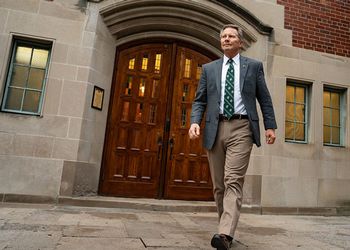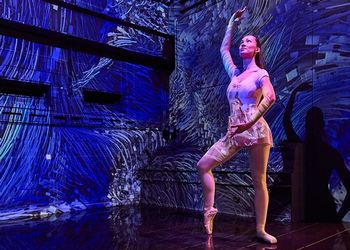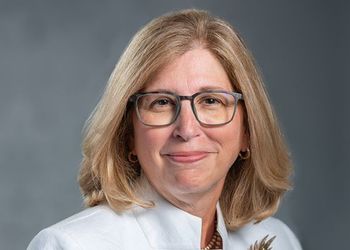Feature: Endowments--A Measure of University Excellence

One measure of a world-class university is its endowments. At MSU, the endowments take many different forms and achieve a variety of dreams.
A PHYSICIAN, A MICHIGAN BUSINESS OWNER, & A SUMMER ESTATE
What sounds like a punchline is actually a diverse sampling of MSU success stories that have resulted from endowments. Not widely known to the public, but much appreciated by the university, endowments can be described as the enduring, multi-strand, green-and-white cords that enable MSU to package big dreams.
Endowments are investments in MSU's future, designed to last forever as perpetual sources of support for a variety of purposes. They add prestige to the university. They range from scholarships, fellowships and professorships to centers, research labs, gardens and even manorial estates.
"Strong institutions have strong endowments," says Bob Groves, vice president for University Advancement. "When alumni and friends establish endowments they simultaneously accomplish three important things. One, they provide a permanent source of funding focused on a university program they feel strongly about. Secondly, they make a difference, in perpetuity, in the lives of people who benefit from the university's education, research and service missions. Finally, they are able to honor a favorite faculty member, colleague or loved one by establishing a permanent memorial in their name."
Endowed chairs and professorships recognize excellence in research and scholarship and form the backbone of world-class universities. These positions serve the department, the college and the university in many ways, including its standing in various academic rankings. Such distinctions can elevate MSU's standing in a particular discipline and can even be the tipping point for success among a field of qualified applicants for research grants and for publication in academic journals. An endowed position offers flexibility for the faculty member, particularly the ability to attract and provide research funds for outstanding graduate students plus the freedom to pursue new areas of research, laying the groundwork for significant research grants in the future.
The Doctor
Dr. Andrea Amalfitano, '84, PhD '89, DO '90, professor of pediatrics, microbiology and molecular genetics, exemplifies how endowments support faculty positions. Amalfitano is the first person to hold the Osteopathic Heritage Foundation Endowed Chair in MSU's College of Osteopathic Medicine.
One of the nation's leading genetic scientists, Amalfitano returned to MSU after working at Duke University Medical Center, the Mayo Clinic, and the C.S. Mott Children's Hospital at the University of Michigan.
Amalfitano brings an allinclusive approach to his work at MSU. He is a practicing physician and diagnostician, a professor teaching both undergraduates and medical students, and the leader of a research team whose efforts seek new approaches and methods for treating diseases. Amalfitano's lab focuses on the feasibility of gene transfer to treat both genetic and non-genetic diseases. His team developed a uniquely improved gene transfer vector and has published multiple papers highlighting their progress in safely and efficiently delivering genetic information into living organs. The Amalfitano team is investigating the use of its gene transfer vectors in vaccine applications to target such diseases as HIV, malaria, C. difficile, plus cancers of the colon, breast, head and neck.
In January, the Big Ten Network's Impact the World series featured Amalfitano's successful diagnosis and treatment of Pompe disease, a form of muscular dystrophy, in a two-year-old patient. If not caught early, this genetic disorder can be fatal. Fortunately for the young patient, Amalfitano not only was able to correctly diagnose the rare condition, but also is one of the foremost experts on how to help the child. Amalfitano and a team at Duke University conducted the first successful clinical trials of a treatment for Pompe.
Amalfitano says that his clinical work is invaluable to his research. "I learn from my patients," he says. "My work as a physician helps me to understand the complexity and intricacies of the kinds of conditions we are attempting to find answers for in our lab."
Because of the endowed chair established through a $1.5 million grant from the Osteopathic Heritage Foundation, MSU undergraduates and medical students have the chance to learn from one of the nation's leading experts in the diagnosis and treatment of genetic diseases, children in Amalfitano's pediatrics practice in Michigan receive excellent medical care, and upcoming young scientists in his lab are participating in exciting research to address some of the world's pressing health problems.
Business Owner The
MSU programs also benefit from endowment. While most such programs fall within MSU's traditional education mission, there are exceptions. In late 2011, $5 million in endowment gift s from members of the Demmer family established the John and Marnie Demmer Center for Business Transformation at MSU. The Demmers wished to help Michigan businesses get started, grow and thrive.
Aft er leaving college in the early 1980s, Scott Schafer began milling wood in a barn on his family's farm in Tecumseh. Schafer developed a local customer base that soon expanded as recognition of the quality of his work grew. Today, Schafer Hardwood Flooring Co. (schaferhardwoodflooring. Com) has 45 full-time employees and a showroom and warehouse in Troy as well as in Tecumseh, where the products are made. They have also established distribution throughout the U.S. and Canada.
At about the same time the Demmer Center was opening at MSU, Scott Schafer recognized that his business had reached a turning point-the business might outgrow his management model. Schafer had already taken a class in lean manufacturing from Jim Manley, managing director of the Demmer Center. He was encouraged by Manley to come to the Demmer Center to gain assistance in moving his company to the next level. "Scott's business is poised to grow and is a perfect candidate for training in lean production, total quality management and strategic business mapping, which are the core of what we are offering to Michigan businesses," says Manley. Schafer, his leadership team, production team, sales team and other staff have been involved in the training.
"Up to now, everything was in Scott's head," says Manley. "The entire operation from production to quality control to material ordering. We helped them to identify ways that they can standardize processes in a lean manufacturing system and expand the business."
"Aft er two months working with Jim Manley and his graduate student, Rahul Seelam, we've made excellent progress," says Schafer. "My entire team is significantly more conscious about avoiding waste in motion and waste of raw material. They are conscious about avoiding reworking, and production is much more efficient." Schafer said that in one visit to the plant, Seelam was about to point out changes in layout to improve productivity.
"The timing for us was perfect," says Schafer. "We were planning to put in a whole new line of equipment. Now we also have the knowledge to change the plant layout for a more efficient and lean operation."
"I can envision the business growing by nearly 50 percent over the next 10 years," says Manley. "That is Scott's ambition, and I believe they can accomplish it."
The endowment fund established by the Demmer family gives Michigan entrepreneurs and small businesses a place to turn for the training and expertise to help them transform and learn how to grow and improve their ability to compete.
The Summer Estate
W.K. Kellogg and his wife, Dr. Carrie Staines Kellogg, built a home on the highest point overlooking Gull Lake in Hickory Corners in 1925-26. The 32-acre estate was their summer home from 1926 to 1942. The property was lent to the U.S. military during World War II to serve wounded veterans. In 1952 the W. K. Kellogg Foundation deeded this estate to MSU, and together with other properties previously deeded to MSU, created the Kellogg Biological Station and Kellogg Research Forest. The home, now called the Manor House, served as offices for education and outreach activities at the newly formed research station.
In 1999 the Kellogg Foundation awarded $3.5 million to MSU to restore the Manor House and estate so that it could have a broader community use. Roof tiles were replaced, Rookwood tiles restored, leaded glass windows repaired, and it was furnished to reflect the style and grandeur of the home when the Kelloggs lived there. The Tudor revival structure now serves as a stately venue for a variety of public and private events, welcoming over 8,000 visitors annually for tours, teas, dinners, celebrations and business and professional meetings.
In 2012, the W.K. Kellogg Foundation established a $1 million endowment for maintaining and sustaining the Manor House and Estate (carriage house, caretaker's house, boathouse, greenhouse, conservatory, windmill, grounds and gardens). MSU will leverage the foundation's funding to raise another $500,000 to bring the endowment to $1.5 million. In addition to providing for care and maintenance of the property, the endowment funds student internships. Interns will work on projects related to the history and legacy of the estate, enhance the grounds and property, and assist with the development of programs that showcase the history of the estate and its founder, W.K. Kellogg.
Endowments for bricks-andmortar are rarer than for other purposes. The Kellogg Foundation endowment in this instance is an example of one of the best uses of endowment for facilities- to provide for the care and maintenance of historic or architecturally significant sites and to involve students in projects that will enhance the property and develop the students' appreciation of the estate's history. This endowment will ensure that the Kellogg Manor House and Estate will continue to welcome people from diverse backgrounds to experience the elegance of the Kellogg family summer estate and learn of W.K. Kellogg's legacy.
Scholarships
The most popular of all endowment gift s is for student scholarship. MSU was surprised just a few years ago with an anonymous gift of $10 million, primarily to be used for student support. The university leadership leveraged $7 million of that gift as matching funds and challenged alumni, faculty and friends to endow scholarships and fellowships. The response was overwhelming-152 undergraduate scholarship funds and 11 graduate fellowships were created with endowment funds totaling some $15 million. As long as there is a Michigan State University, there will be students gratefully receiving scholarships because of the strong response to the Spartan Scholarship Challenge and the Spartan Cornerstone Challenge of the early 21st century.
Endowment at MSU
The way an endowment works is that the principal gift is invested in the university Common Investment Fund. A portion of the interest earned is expended to achieve the goals of the endowment. The endowment fund retains the principal plus any additional interest above the university's spending rate (currently 5 percent of principal). Thus, the following year will see growth in the expendable amount because of the growth in the investment.
MSU does not have a long history of raising endowment funds. Early gift s were rare, donorinspired occasions. For most of our history, MSU relied on its standing as a public land-grant university and on funding from state and federal sources as well as from tuition and fees. Today, however, MSU is making a strong effort to build our endowment in order to secure student scholarships and graduate fellowships to ease the financial burden on future generations of Spartans.
MSU is also creating the endowed faculty positions that a world-class research university needs to be competitive in attracting the best and brightest faculty and students who want to work with others at the very top of their field.
Spartan alumni and friends have many options to help build MSU's endowment. An individual or organization can create a new named fund (e.g. The John and Mary Spartan Endowed Scholarship) for a gift of $30,000 or more. Some groups-regional alumni clubs or groups of friends-raise money or pool their resources to create an endowment to support students from their area or to honor a favorite professor. The university, as well as most of the colleges and non-college units (like WKAR broadcasting), have discretionary endowment funds that can be used to support ongoing or urgent needs. There is no minimum for contributing to these or other existing endowment funds.
Alisa Healy is a writer for MSU University Development and a life member of the MSU Alumni Association.
Currently, MSU has more than 90 endowments that have been created, or conditionally established through a planned gift provision, to support one or more endowed chair positions. Yet, MSU lags in comparison to peer institutions in the number of endowed chairs, leaving the university vulnerable to losing its own rising stars.
"We are grateful for the generosity and vision of donors who play such a key role in MSU's ability to recruit and retain first-rate faculty by endowing chair positions," says MSU Provost Kim Wilcox. "Named chairs allow the university to build academic excellence with effects that are far-reaching."
The Ripple Effect of Endowed Chairs
In the academic world, funding a chair is a lot bigger commitment than buying a piece of furniture. And it has a lot bigger impact.
Endowed chairs are at the center of outstanding academic programs and their effect radiates out across the university and beyond. They are the highest honors awarded to faculty. As such, they enable the university to attract rising stars. These high caliber professors, in turn, attract the very best graduate students to the university. Additionally, the support from an endowed chair provides a funding buffer to enable faculty to remain current and leading edge in their research rather than "following the funding." Ultimately, their work provides distinguished leadership in research and education that leads to discoveries that touch the lives of countless others.
Help Secure a Stronger Future for MSU
> Create a new endowment or add to an existing one. Contact: Sarah Bloom, director of individual giving, blom@msu.edu or (517) 884-1091.



